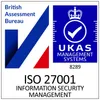PCI DSS (Payment Card Industry Data Security Standard)


- Secure Payment Data with PCI DSS Compliance Solutions
Comprehensive PCI DSS Assessment Services: Ensuring Payment Data Security and Compliance
The Payment Card Industry Data Security Standard (PCI DSS) is a globally recognised set of security requirements established to ensure that all entities accepting, processing, storing, or transmitting credit card information maintain a secure environment. Developed by the Payment Card Industry Security Standards Council (PCI SSC), which includes major card brands like Visa, MasterCard, American Express, Discover, Union Pay, and JCB, PCI DSS aims to protect sensitive cardholder data and reduce credit card fraud by setting comprehensive security requirements for organisations.
- Our PCI DSS Assessment Services
We offer a comprehensive suite of services to assist organisations in achieving and maintaining PCI DSS compliance:
- PCI DSS Compliance Assessment
- Penetration Testing and Vulnerability Assessments
- Scope Definition and Strategy Development
- Managed PCI DSS Compliance Services
Certified for excellence in cybersecurity and compliance standards.












PCI DSS Compliance Assessment
- Level 1–4 Assessment Services: We provide assessment services for all merchant and service provider levels, from large enterprises (Level 1) to smaller businesses (Levels 2–4). Our methodology includes a detailed Report on Compliance (ROC) and Attestation of Compliance (AOC), essential for demonstrating compliance.
- Facilitated Self-Assessment: For Level 2, 3, and 4 merchants and service providers, we offer guided Self-Assessment Questionnaires (SAQs) with support from our Qualified Security Assessors (QSAs).
Scope Definition and Strategy Development
- Scope Identification: We assist in defining the scope of your cardholder data environment, ensuring all relevant systems are included and secured.
- Strategic Planning: Our experts develop tailored strategies to minimise risks and streamline the compliance process, aligning with your organisation’s objectives.
Risk Analysis and Remediation Support
Thorough Risk Assessments: We conduct comprehensive risk analyses to identify potential threats to cardholder data.
Remediation Assistance: Our team offers continuous support to address identified vulnerabilities, guiding you from initial assessment to full compliance.
PCI DSS 4.0 and Cloud Workshops
- Educational Workshops: Stay informed about the latest updates, including PCI DSS version 4.0 and its implications for cloud technologies, through our specialised workshops.
- Implementation Guidance: We provide guidance on implementing new requirements and best practices introduced in the latest version of PCI DSS.
Training and Awareness Programs
Customised Training: We design and deliver tailored training programmes to enhance your team’s understanding of PCI DSS requirements and their roles in maintaining compliance.
Awareness Campaigns: Our awareness initiatives foster a culture of security within your organisation, emphasising the importance of protecting cardholder data.
Managed PCI DSS Compliance Services:
- Continuous Monitoring: We offer ongoing monitoring and assessment of your cardholder data environment to ensure continuous compliance with PCI DSS standards.
- Documentation Management: Our services include managing and maintaining essential compliance documentation, such as security policies, procedures, and audit logs.
Benefits of PCI DSS Compliance
Enhanced Data Security: PCI DSS ensures robust security measures are in place to safeguard sensitive payment card information from unauthorised access, breaches, and theft.
Reduced Risk of Data Breaches: By identifying vulnerabilities and implementing strong security controls, PCI DSS reduces the risk of costly and damaging data breaches.
Increased Customer Trust and Confidence: Compliance demonstrates a commitment to data security, boosting customer confidence and strengthening your brand reputation.
Avoidance of Fines and Penalties: Non-compliance with PCI DSS can result in hefty fines, legal consequences, and restrictions from payment card networks. Compliance helps you avoid these financial and legal repercussions.
Streamlined Security Processes: PCI DSS encourages the adoption of standardised security protocols, making data protection processes more efficient and easier to manage across the organisation.
Competitive Advantage: Being PCI DSS compliant differentiates your business in a crowded marketplace, giving you an edge over competitors who may not meet these standards.
Global Recognition: As an internationally recognised standard, PCI DSS compliance facilitates smoother operations and partnerships across global markets.
Improved Incident Response: PCI DSS includes requirements for robust incident response plans, ensuring a swift and effective reaction in case of security breaches or data compromises.
Long-Term Cost Savings: Preventing data breaches and avoiding regulatory fines results in significant cost savings over time, offsetting the initial investment in compliance.
Alignment with Other Compliance Standards: PCI DSS shares similarities with other data protection regulations (e.g., GDPR, ISO 27001), making it easier to align multiple compliance efforts simultaneously.
By achieving PCI DSS compliance, organisations not only meet regulatory obligations but also demonstrate a proactive approach to protecting sensitive data, building customer trust, and fostering long-term business resilience.
- Faq
Frequently Asked Questions (FAQs) About PCI DSS Compliance
Navigating PCI DSS compliance can be complex, but understanding its key aspects is crucial for securing payment card data and maintaining regulatory standards. To the right, you’ll find answers to common questions to help clarify the process, benefits, and requirements of PCI DSS compliance for your organisation.
Can't find what you are looking for?
Let's Talk: Engage with Us in a Conversation Tailored Just for You
Call us any time
(+44) 203-130-1723
A substantial proportion of the global economy depends upon people being able to use payment cards and being confident that their data is secure and will not be stolen and abused by criminals. The Payment Card Industry Data Security Standard (PCI DSS) seeks to ensure this.
PCI DSS is a global standard, published by the Payment Card Security Standards Council (PCI SSC) which is sponsored by the major card brands: Visa, MasterCard, American Express, Discover, JCB and Union Pay. It covers all aspects of data security across the entire payment card landcape.
Read more about the PCI DSS here
Any organisation, regardless of size, that stores, processes, or transmits payment card information must comply with PCI DSS requirements.
Non-compliance can result in hefty fines, increased transaction fees, loss of payment processing privileges, reputational damage, and higher vulnerability to data breaches.
PCI DSS compliance is an ongoing process. Organisations must conduct annual assessments, including vulnerability scans, penetration testing, and audits, to maintain their compliance status.
PCI DSS has 12 key requirements, including maintaining secure networks, protecting cardholder data, implementing strong access control measures, regularly monitoring systems, and maintaining an information security policy.
Compliance ensures that customers’ payment card data is protected, fostering trust and confidence in your organisation.
- SAQ (Self-Assessment Questionnaire): Used by smaller merchants or service providers to validate compliance through self-assessment.
- ROC (Report on Compliance): A formal audit performed by a Qualified Security Assessor (QSA) for larger organisations or Level 1 merchants.
The timeline varies depending on the organisation's size, scope, and current security posture. On average, it can take anywhere from a few weeks to several months.
While PCI DSS significantly reduces the risk of data breaches, no system can guarantee 100% security. However, compliance ensures robust security controls are in place.
- PCI DSS: Focuses specifically on securing payment card information.
- GDPR: Focuses on protecting personal data of EU citizens, covering broader privacy concerns.
Absolutely! PCI DSS is scalable and applies to businesses of all sizes. Small businesses can often achieve compliance through a simplified Self-Assessment Questionnaire (SAQ).
Yes, all e-commerce businesses handling payment card transactions must comply with PCI DSS standards.
A QSA is a certified professional authorised to assess an organisation’s compliance with PCI DSS requirements and produce a Report on Compliance (ROC).
Vulnerability scans should be performed quarterly and after significant changes to your network. Penetration tests should be conducted annually or after major infrastructure changes.
While certain tasks (e.g., audits, scans, testing) can be outsourced to experts, ultimate responsibility for PCI DSS compliance always lies with the organisation.
